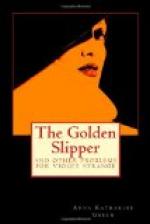Meantime, for all her interest in the case in hand, Violet could not help casting a hurried look about her, in gratification of the curiosity incited by her entrance into a house signalized from its foundation by such a series of tragic events. The result was disappointing. The walls were plain, the furniture simple. Nothing suggestive in either, unless it was the fact that nothing was new, nothing modern. As it looked in the days of Burr and Hamilton so it looked to-day, even to the rather startling detail of candles which did duty on every side in place of gas.
As Violet recalled the reason for this, the fascination of the past seized upon her imagination. There was no knowing where this might have carried her, had not the feverish gleam in Miss Digby’s eyes warned her that the present held its own excitement. Instantly, she was all attention and listening with undivided mind to that lady’s disclosures.
They were brief and to the following effect:
The dinner which had brought some half-dozen people together in this house had been given in celebration of her impending marriage. But it was also in a way meant as a compliment to one of the other guests, a Mr. Spielhagen, who, during the week, had succeeded in demonstrating to a few experts the value of a discovery he had made which would transform a great industry.
In speaking of this discovery, Miss Digby did not go into particulars, the whole matter being far beyond her understanding; but in stating its value she openly acknowledged that it was in the line of Mr. Cornell’s own work, and one which involved calculations and a formula which, if prematurely disclosed, would invalidate the contract Mr. Spielhagen hoped to make, and thus destroy his present hopes.
Of this formula but two copies existed. One was locked up in a safe deposit vault in Boston, the other he had brought into the house on his person, and it was the latter which was now missing, having been abstracted during the evening from a manuscript of sixteen or more sheets, under circumstances which she would now endeavour to relate.
Mr. Van Broecklyn, their host, had in his melancholy life but one interest which could be at all absorbing. This was for explosives. As consequence, much of the talk at the dinner-table had been on Mr. Spielhagen’s discovery, and possible changes it might introduce into this especial industry. As these, worked out from a formula kept secret from the trade, could not but affect greatly Mr. Cornell’s interests, she found herself listening intently, when Mr. Van Broecklyn, with an apology for his interference, ventured to remark that if Mr. Spielhagen had made a valuable discovery in this line, so had he, and one which he had substantiated by many experiments. It was not a marketable one, such as Mr. Spielhagen’s was, but in his work upon the same, and in the tests which he had been led to make, he had discovered certain instances he would gladly name, which demanded exceptional procedure to be successful. If Mr. Spielhagen’s method did not allow for these exceptions, nor make suitable provision for them, then Mr. Spielhagen’s method would fail more times than it would succeed. Did it so allow and so provide? It would relieve him greatly to learn that it did.




